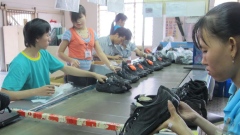Chances await VN shoemakers in EU market

The Generalized System of Preferences, known as GSP for short, is a scheme that gives preferential access for a wide range of industrial and agricultural products originating from certain developing countries to the EU markets. The preferential treatment includes reduced or zero customs duties.
Under the newly-released GSP scheme, the average duty for Vietnamese-made footwear exports to the EU is lowered from 12.4 percent to between 3.5 and 4 percent, starting January 1, 2014.
“The door to the EU market is open wide for local footwear manufacturers if they can take advantage of this opportunity,” commented Nguyen Van Le, deputy CEO of Dong Hung shoemaker.
The EU is the Vietnam’s largest exporting market for footwear products, accounting for $3 billion, or 35 percent, of total export turnover last year.
However, the global economic slowdown has forced consumers in the market to cut spending. Many European importers have asked Vietnamese shoemakers to cut prices by 5 to 7 percent for new contracts in 2013 as more and more consumers are thinking twice about their shopping.
“The GSP will enable manufacturers to lower prices,” Le said.
Dong Co has made some 2.5 million pairs of shoes, worth a combined $15 million, so far this year, and some importers have also demanded that the company cut prices as “the import tax to the EU remains high,” he said.
“The EU consumers will benefit from the lowered import tax under the GSP, while local footwear makers can also grab this chance to increase export volumes,” he added.
Vietnam currently stands only behind China when it comes to footwear exports to the EU, according to Diep Thanh Kiet, deputy chairman of the Vietnam Leather and Footwear Association (Lefaso).
“This is because of our young workforce with good skills,” he explained, adding that the competitiveness can even be increased if Vietnam manages to reach a free trade agreement with the EU.
“Under the FTA, the tax rate for footwear will be reduced to zero, which will enable local shoemakers to expand markets,” he said.
What the stars mean:
★ Poor ★ ★ Promising ★★★ Good ★★★★ Very good ★★★★★ Exceptional
 Tag:
Tag:
Related Contents
Latest News
More News
- Hermes joins Long Thanh cargo terminal development (February 04, 2026 | 15:59)
- SCG enhances production and distribution in Vietnam (February 04, 2026 | 08:00)
- UNIVACCO strengthens Asia expansion with Vietnam facility (February 03, 2026 | 08:00)
- Cai Mep Ha Port project wins approval with $1.95bn investment (February 02, 2026 | 16:17)
- Repositioning Vietnam in Asia’s manufacturing race (February 02, 2026 | 16:00)
- Manufacturing growth remains solid in early 2026 (February 02, 2026 | 15:28)
- Navigating venture capital trends across the continent (February 02, 2026 | 14:00)
- Motivations to achieve high growth (February 02, 2026 | 11:00)
- Capacity and regulations among British areas of expertise in IFCs (February 02, 2026 | 09:09)
- Transition underway in German investment across Vietnam (February 02, 2026 | 08:00)






















 Mobile Version
Mobile Version